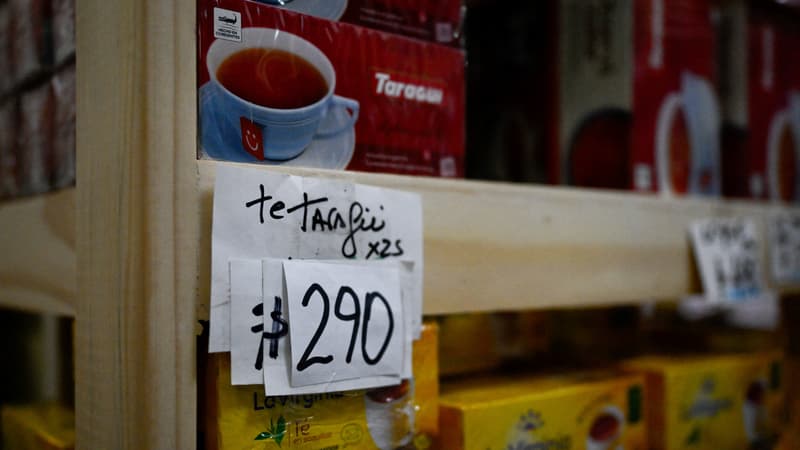“This doesn’t stop,” whispers Paola Basso, hastily pasting one label on top of another in her convenience store in the Buenos Aires suburb, where the victory of the ultraliberal Javier Milei in the presidential elections has triggered new price increases, which continue. to feed inflation that is already at 143% in one year. And more seem imminent.
On the shelves, some products have up to four superimposed labels, which attests to the dizzying inflation. “These are crazy days!” whispers Fernando Savore, Paola’s husband and vice president of the Buenos Aires shopkeepers’ federation. “Although we already changed prices last week, we have seen increases of around 25 to 30% among wholesalers” compared to the Friday before the election.
“The 15th is the end of the month”
The outgoing center-left government of former President Alberto Fernández this week renewed an agreement for the regulation of a list of essential products in supermarkets. But it was undoubtedly the last time with the inauguration on December 10 of Javier Milei, a supporter of price liberalization and opposed to any regulation by the State.
The imminent end of the agreement on price controls “encourages price increases,” economist Hernán Letcher, director of the Center for Political Economy of Argentina, explains to AFP. “The increase will be more marked next month, because the market expects a significant devaluation (of the peso) when Milei takes office, and therefore the possibility of an inflationary resurgence,” he predicts.
“In Argentina the 15th is the end of the month,” summarizes Fernando Savore. “The first days the customer pays in cash, then on the 15th with a credit card that previously was used to pay for television or shoes.” Mario Amor, a 70-year-old customer, walks through the aisles and carefully examines the labels. “It’s gone up a lot again, I’m trying to see who has better prices, I don’t know where to buy anymore,” he laments before leaving his empty shopping bag.
In front of another apartment, Clara Tedesco, a 60-year-old seamstress, says she is “horrified” to see that the price of cheese “has gone up again this week.” “It’s exhausting, you study the prices, you go to one place, another, you compare, you do the calculations, you come back… Buying is more difficult than finding a husband,” she arrives – she jokes.
Kilo of grapes at 6,000 pesos
In the butcher shops in the Mataderos neighborhood the price tables are blank. “We no longer waste time writing to them, it changes every two days,” summarizes manager Evelyn García. “The clients know it,” she says, saying that she sees “more sadness than anger” in her eyes because “you have to eat well.” Sales of more expensive cuts of meat have declined in favor of cheaper pork chops or lower cuts.
At a street market in Villa Madero, near Morón, Clarisa Gómez dusts off a box of kiwis at her fruit and vegetable stand. “I take care of them like a jewel, they cost 1,000 pesos each,” or just over 2 dollars at the official exchange rate. It indicates that all prices have risen since Monday: “grapes at 6,000 pesos per kilo (16 dollars), pineapples at 3,000 (8 dollars), bananas at 1,700 (4.5 dollars) and apples at 1,000.”
“People buy two apples and a banana. If this continues, I will have to sell by the slice,” he jokes.
Source: BFM TV


